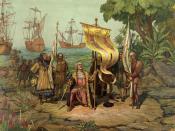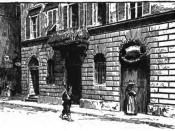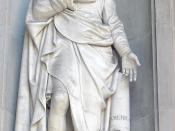The world in the late fifteenth and early sixteenth centuries was vastly different than it is today. The Crusades had given Europeans a taste for the riches of the East. Travel was dangerous. Communications were uncertain, at best. The nations of Europe were all monarchies undergoing the breakdown of the feudal system due to the commercial revolution. Gutenberg's advances in printing during the middle of the fifteenth century meant that ordinary people had begun to learn to read. The Church was in a position where she could, and did, wield both secular and spiritual power. The educated class held an awed reverence for the writings of the ancient Greeks. New ideas, expressed publicly, especially when those ideas stood in stark contrast to the classics, were rare. It is from this world that the exploration and colonization of the Americas was begun. The voyages of Columbus and Vespucci reflect some of the dynamics of their time.
There is perhaps no better example of a man of his time than Columbus. Born the son of a Genoese weaver, Columbus learned to read as an adult, well after he had mastered seamanship. The more that he studied the cosmographers of the ancient world, the writings of Marco Polo, and Pierre d'Ailly's "Imago Mundi", the more that he stood convinced that he could sail West from Spain some three thousand miles and arrive in the East. Upon his return to Spain after his first voyage of 1492, he was given the titles "Admiral of the Ocean Seas" and "Viceroy of the Indies." Columbus was hailed as a hero who had opened the Western trade route to the Indies and discovered new lands for Spain.
Yet, Portugal strongly contested this. Since Portugal owned the Azores, it asserted that it also had dominion over the Atlantic...


